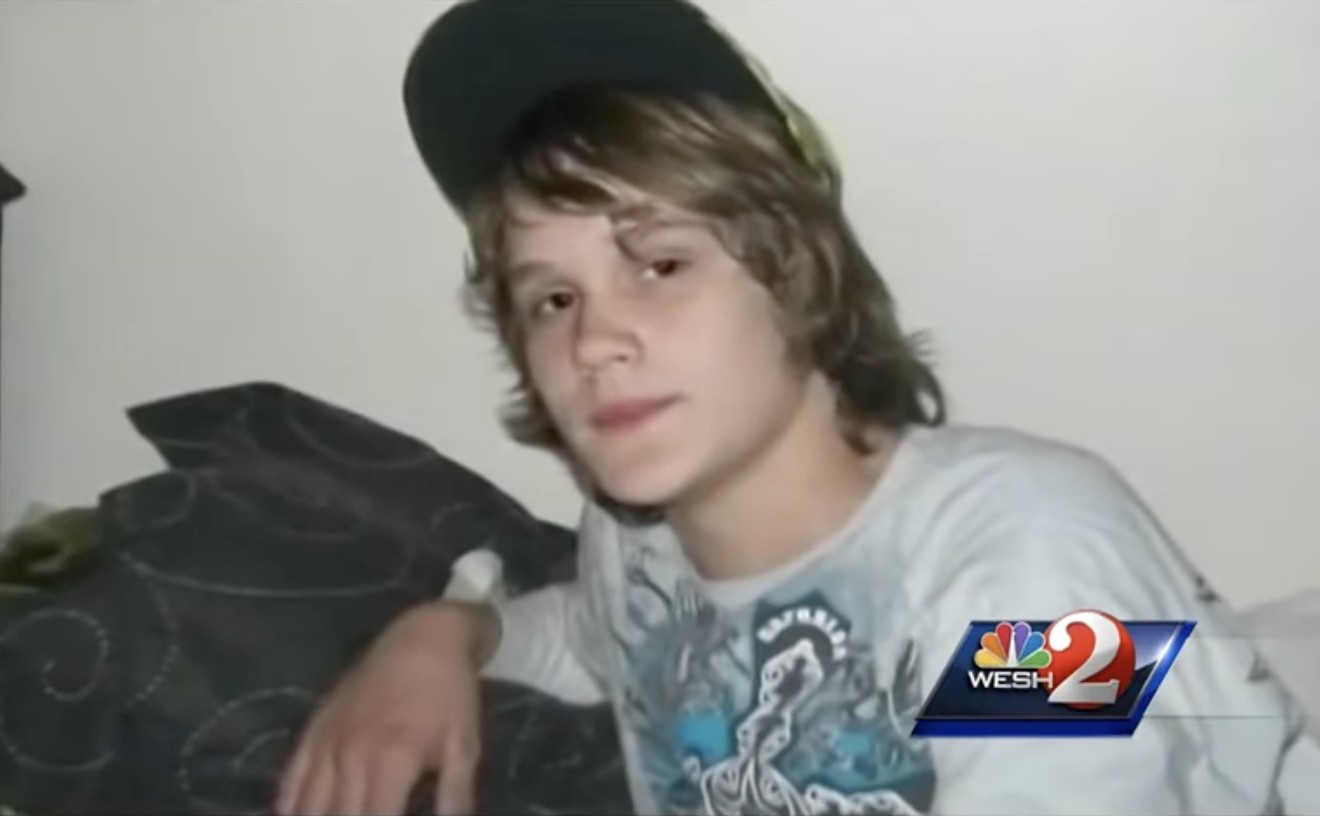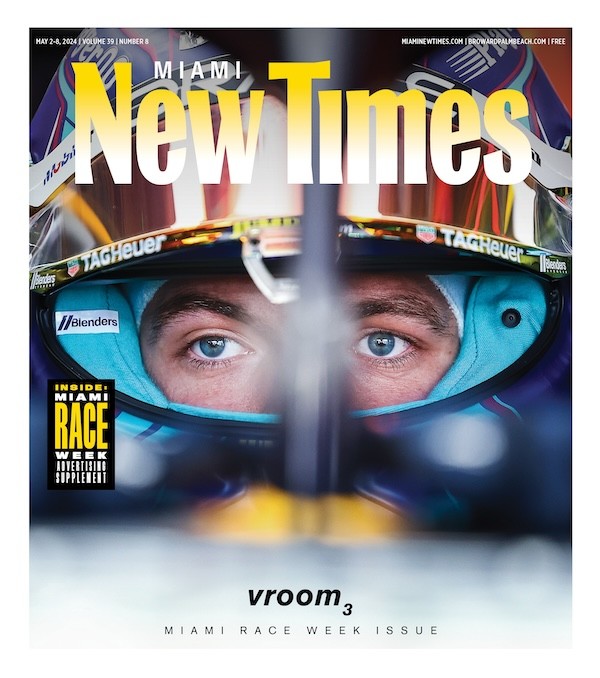"Nigga be a leader, not a follower."
"What?"
"Master P said that."
"You still listen to rap?"
"Why?"
"It's just all about marketing now."
-- Matt "Big Pussy, Jr.," Bompensiero to Anthony Soprano, Jr., The Sopranos
The difference between working with hip-hop stars and fashion models is pretty simple. South Beach photographer's assistant Susan Egan, a veteran of magazine shoots for both, breaks it down. "The models never have a lot of food, just light salads. But they're on time," she quips. "Hip-hop guys are two to five hours late, and they always arrive with a posse. But the food's great, and there's plenty of it."
At the end of the day, though, the results are the same: a set of dramatic shots that will help sell a product. The commodity that currently has Egan readying the fog machines inside downtown's Park West studio is Trick Daddy, which complicates the formula a bit. After all, Trick -- Miami's premier rap star of the moment -- isn't a piece of jewelry or an expensive pair of shoes. He's flesh and blood. And unlike a model, or even a Hollywood actor, the persona he's carefully fashioned on his albums isn't a role, a character study to be sloughed off with the next job. At least that's what Trick Daddy himself says, or rather grunts dismissively at Kulchur's questions. Right now he's got weightier matters than getting philosophical with some notebook-toting white boy. He's about to become the cover star for the next issue of the Source.
Strapped in behind the wheel of a twenty-foot-long dragster, Trick is throwing his trademark gold-toothed scowl at the camera. Hot lights shine down as flashbulbs pop. Thick fog begins pouring out from behind the car, but even photographer Jerome Albertini can tell it's more than the heat and smoke that's got Trick on edge.
"You wanna hear something else?" Albertini asks in his thick French accent as the chilled-out jazzy shuffle of an A Tribe Called Quest CD plays loudly in the air. Trick nods his head in the direction of the music: "I don't know what that is."
One of Trick's friends heads for the CD player, and soon the raw staccato beats of Trick's own www.thug.com album are booming out: "I'm doin' this one for the thugs/and the niggers on the corner selling drugs." Immediately Trick relaxes and begins mouthing the words to his lyrics. Although the shift is subtle -- he never stops grimacing on cue -- the entire crew can sense that things have just fallen into place.
There's a new problem on the set. A team from Channel 7's Deco Drive is here to shoot what should be a simple two minutes of fluff: Hometown rapper makes good. Trick Daddy has a distribution deal through major label Atlantic, and as his imminent appearance on the front of the Source would seem to indicate, his new album, Thugs Are Us, is about to move him from "bubbling under" to the center of the hip-hop world, the first Miami rapper to do so since the heyday of Luther Campbell and 2 Live Crew more than a decade ago.
Deco Drive's Odette Burton takes Source fashion editor Liza Montoya aside and asks why the magazine is spotlighting Trick Daddy. It's meant as a softball question, and Burton looks perplexed as Montoya moves off for a huddled conference with David Curcurito, the publication's creative director and the orchestrator of today's shoot. Curcurito immediately whips out his cell phone and dials up the Source's editor in chief, Carlito Rodriguez, in New York City, who begins delivering a precise spiel. Curcurito then carefully relays some choice phrases back to Montoya: "represent the Dirty South"; "address the previous lack of attention to Miami"; "Trick Daddy is going to be big."
None of these lines seems controversial, the kind of PR spin requiring an emergency strategy session. But the Source isn't just another music magazine. In the world of hip-hop, it matters. Sure, its sales figures are impressive enough (with 450,000 copies sold each month, it's number four behind Rolling Stone, Spin, and Vibe; in terms of newsstand sales, it's number one), but the magazine's influence travels far beyond advertising concerns. Not only rap fans but rappers themselves read the Source with the utmost seriousness; remarks that may be offhand to some can produce dramatic consequences. Artists such as the Notorious B.I.G. and LL Cool J have written hit songs that proudly cite their glowing reviews in the magazine, while rumors fly of rappers who've made veiled threats to Source writers over negative pieces.
Other hip-hop publications apparently have seen actual violence. In November 1998 then-Vibe editor Danyel Smith accused rapper Foxy Brown of assaulting her in anger over a less than flattering cover pose. That same month Jesse Washington, editor of the now-defunct Blaze, charged Puff Daddy producer Deric Angelettie with barging into his office. Apparently upset over Blaze's unveiling of the shadowy identity behind his Madd Rapper project, Angelettie and two accomplices allegedly beat him with his own chair. That came on the heels of an August 1998 incident in which Wyclef Jean reportedly pulled a gun on Washington over a critical review.
Difficult to imagine, say, Don Henley winging a chair at Rolling Stone's Jann Wenner over a nasty concert notice, or Paul Simon reaching for his pistol if an Esquire shutterbug highlighted his bald spot. But then, unlike rockers, hip-hoppers spend little time worrying about the art-versus-commerce debate. They simply view them as inseparable. Nirvana's Kurt Cobain may have agonized over his platinum sales awards and Top 40 radio play -- and whether they delegitimized his muse -- but for most rappers the marketplace is the only arbiter that counts. Which is precisely what makes hip-hop journalism so problematic. Negative reviews, no matter how thoughtful or nuanced, are seen as both personal attacks and economic sabotage. And as the shooting deaths of Tupac Shakur and the Notorious B.I.G. seem to demonstrate, sticks and stones may break one's bones, but words are worth killing over.
"This isn't fashion," Montoya says of her job as fashion editor. With a laugh she continues, "You can do a lot more styling with Britney Spears, but it's all a façade. It comes out of thin air. Hip-hop guys have a history. Their images are generally their own; that's who they are." Or at least who they want to be. Montoya recalls one cover shoot with a well-known California rapper. The layout, previously agreed to by the rapper's management, featured an elaborate James Bond-style motif. When it actually came time to snap the pictures, however, the rapper balked at such imagery and walked off the set. At the last minute he had decided his fans would never accept such a glamorous remodeling of his persona. "We had to flush a $2000 helicopter rental," Montoya sighs.
That's the business of hip-hop, by turns either comical or tragic. Yet Ted Lucas, president of Trick Daddy's Slip 'N Slide label, explains just what's at stake: "If you walk down to the Dade County Justice Center and look at all the attorneys in there, how many are black? Five?" He fixes his eyes firmly on Kulchur and asks sharply: "How many black people get the chance to go to law school? [Hip-hop] is an opportunity for black people to make it."
Hip-hop may never move past its uneasy relationship with the pop marketplace -- at least as long as its practitioners remain socially marginalized. But it's that very frisson that gives the music its sense of excitement and cultural relevancy, as opposed to modern-day rock and roll. At the very least that tension provides for some awfully entertaining moments.
During a lull in the Source photo shoot, Odette Burton finally attempts her on-camera interview with Trick Daddy. Stripped down to a wife-beater and low-slung pants drooping off his Polo underwear, Trick strikes a pose far removed from Deco Drive's usual rotation of halter tops and haute couture.
"My music represents everything I stand for, because God loves thugs too," Trick drawls, his eyes darting down to the large diamond-studded cross hanging on a long chain around his neck. "My first album was about my problems growing up as a shorty. My new album is about how times are changing."
Burton is still fishing for a pithy sound bite and asks him to elaborate on these ever-changing times. "These days if you get sentenced, you'll never get out," Trick stresses, warming to the subject. Burton manages to maintain her smile as Trick grows impassioned, decrying the mandatory minimum-sentencing laws for drug-related offenses with a telling dip into legalese. Heady stuff, but the details of Trick's own incarceration for cocaine trafficking aren't exactly Deco Drive material. Perhaps sensing Burton's growing exasperation, Trick abruptly shifts gear. He raps one of his verses a cappella, stopping short when he reaches an obscenity. "I can't say that on TV," he laughs. "They can take me out of the ghetto, but they can't take the ghetto out of me."










